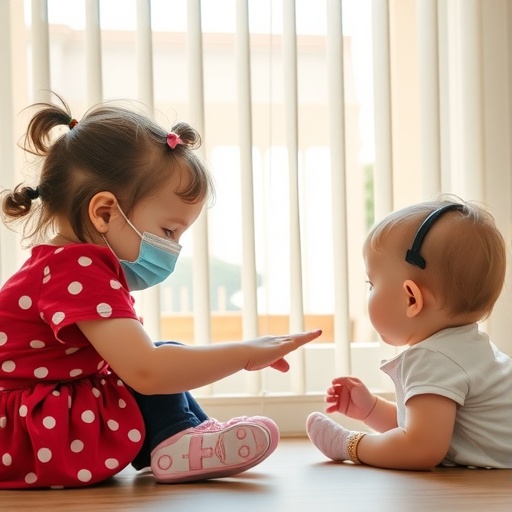In a deeply transformative era marked by the COVID-19 pandemic, the developmental trajectories of children have come under scrutiny like never before. The ongoing global health crisis served as a unique laboratory, allowing researchers to investigate how unprecedented social restrictions and lockdowns have influenced early childhood development, particularly for two-year-olds in England. The study by Wilding, Earle, and Laxton presents a critical examination of these effects, taking a holistic approach by listening to parents—the primary caregivers and first educators of their young children.
As society grappled with the sudden shift to lockdown measures, parents faced an array of challenges while navigating their children’s needs. The aforementioned study delves into these parental experiences, shedding light on how two-year-olds were affected not just in terms of their routines but also regarding social and emotional development. This age group, which is in a crucial stage of cognitive and social growth, provides a compelling focus for understanding the broader implications of lockdown measures.
The lockdowns disrupted the typical social interactions and routines that are vital to a toddler’s development. Playdates, trips to parks, and participation in early education programs were curtailed, leading to significant changes in how these young children learned to engage with their environment and peers. The researchers highlight the profound impact this isolation had on two-year-olds, who thrived on interactions with their caregivers and peers as vital components of their growth. Parents reported noticeable changes in their children’s behaviors, including heightened anxiety, increased clinginess to caregivers, and regression in various developmental milestones.
Moreover, the study captures the hearts of many parents, providing a platform for them to express their concerns, fears, and observations during this tumultuous time. The qualitative data gathered offers insights that are invaluable for future public health policies and educational frameworks, emphasizing the necessity of prioritizing mental health and developmental support for young children in crisis situations. Listening to parents brings to light not only individual experiences but a collective understanding of how the lockdown altered familial dynamics and children’s foundational understandings of social behavior.
Interestingly, while some negative impacts emerged from the lockdown experiences, the study also uncovers moments of growth and resilience. Parents reported at times feeling closer to their children due to the increased time spent together. This unexpected silver lining prompts discussions about the potential for enhanced parent-child bonding under constrained circumstances and raises important questions about how such experiences might influence future developmental pathways.
This research is particularly timely given the ongoing discussions in educational policy circles about re-envisioning early childhood education post-pandemic. It suggests a paradigm shift towards recognizing the integral role of parents not just as caregivers but as active participants in the educational landscape. Engaging parents as stakeholders can lead to more effective support systems for young children, enabling a collaborative approach to early development.
Furthermore, the implications of the findings extend beyond family dynamics. They call for a reassessment of the structures supporting early childhood education and care in England and beyond. As policymakers strive to navigate the ongoing fallout from the pandemic, insights from this study provide a critical evidence base for developing future initiatives aimed at safeguarding the developmental needs of young children during emergencies.
As the discourse around children’s mental health and well-being continues to evolve, the study serves as a crucial resource for educators, psychologists, and social workers looking to implement strategies that foster resilience among toddlers and their families. Interventions may need to focus not just on academic readiness but on emotional intelligence and social competencies that were notably challenged during the lockdown.
The researchers also highlight the importance of ongoing monitoring of children who experienced such disruptions. The need for longitudinal research to assess the long-term impacts of the COVID-19 lockdown on child development is essential. Tracking these children’s progress as they emerge from the pandemic will be critical in ensuring that any latent issues are addressed promptly and effectively.
As educators and childcare professionals look ahead, this study underscores the urgent need for flexibility in educational programming, particularly for younger children. The findings advocate for a more integrative approach that accounts for the unique experiences of children in the wake of global crises, encouraging the development of support structures that respond directly to their needs. Emphasizing play-based learning and emotional support could potentially create a more nurturing environment for children as they readjust to post-lockdown life.
In a world forever altered by the pandemic, lessons learned must inform future practices in early childhood education. This study serves as a reminder that the voices of parents and their children must remain at the forefront of discussions about educational reform and public health policy. By listening closely to their experiences, we can foster a future where every child has the opportunity to thrive, even in the face of extraordinary challenges.
The echoes of the COVID-19 pandemic will be long-lasting, but by embracing the insights gained from the struggles of today, we can carve pathways to a brighter tomorrow for all children. Research such as that conducted by Wilding, Earle, and Laxton not only documents the realities faced by families but also provides a roadmap for how society can better support its youngest members through adversity.
Ultimately, the goal must be clear: to not only recover from the disruptions caused by the pandemic but to emerge stronger, more connected, and more responsive to the needs of our children. The time to act is now, and the urgency of this moment beckons for reform that puts the well-being of our youngest citizens first and foremost.
Subject of Research: The impact of COVID-19 lockdown on two-year-olds in England.
Article Title: Listening to Parents: Lessons from the Impact of Lockdown on Two-Year-Olds in England
Article References:
Wilding, L., Earle, L. & Laxton, D. Listening to Parents: Lessons from the Impact of Lockdown on Two-Year-Olds in England. Early Childhood Educ J (2025). https://doi.org/10.1007/s10643-025-01984-x
Image Credits: AI Generated
DOI:
Keywords: COVID-19, early childhood development, parental perspective, mental health, lockdown effects, education policy.




